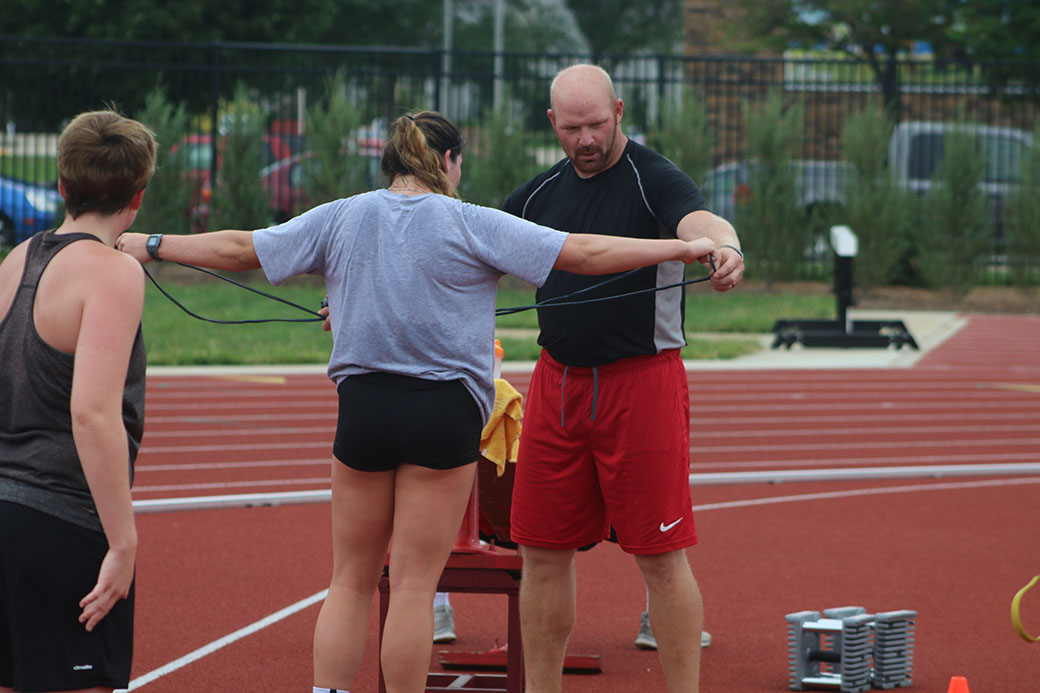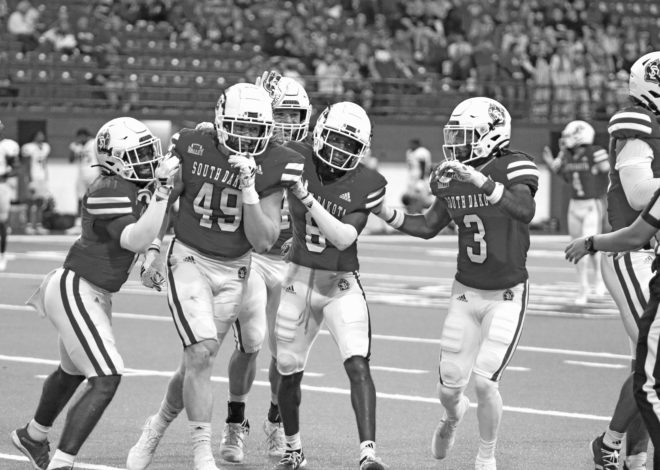
Olympic fever hits home for Coyote coach
With the recent Olympic games in Brazil, the nation was gripped with Olympic fever, as it is every four years. For South Dakota throwing coach A.G. Kruger, these Olympics were a bit different—they were the first Olympic Games he wouldn’t be competing in since 2004.
Kruger represented Team USA in the hammer throw in Athens in 2004, Beijing in 2008 and London in 2012. Unfortunately for Kruger he finished fourth at last year’s Olympic trials. The cutoff to compete is third.
“Fourth place in the trials is the suckiest spot to be in, because you’re the first one out,” Kruger said. “I wish I could’ve got it done, but I didn’t get it done.”
Despite going to three Olympics throwing the hammer, the hammer throw is not where Kruger got his start. When he was in eighth grade he was a sprinter and a high jumper. He picked up discus based on a chance encounter.
“This other kid was a discus thrower and he came over and high jumped and he high jumped higher than I did,” Kruger said. “Then I went over and he threw discus and I threw discus farther than he did, so we switched. So that’s how I became a thrower.”
From then on Kruger was a thrower. He would continue his athletic career at Morningside College in Sioux City, Iowa. There, Kruger played football and threw discus. It wasn’t until his coach asked him to pick up another sport that he got into hammer throw. His coach gave him a choice of shot put or hammer throw and for Kruger the choice was simple.
“I don’t like shot put — it doesn’t go far enough. So, I said, ‘let’s throw the hammer,'” Kruger said.
In his senior year at Morningside, Kruger was the NCAA Division II national champion in hammer throw en route to becoming the 2001 NCAA Division II National Outdoor Male Track and Field Athlete of the Year.
After graduating with a degree in secondary education with a focus on mathematics, Kruger substitute taught in Sioux City for a year. That’s when the coach at Ashland University in Ashland, Ohio, a four-time Olympian himself, invited Kruger to come out and start training. Kruger would train at Ashland from 2002 to the fall of 2015.
It was in Ohio Kruger discovered one of the downsides to the Olympic dream: money.
“When I moved out to Ohio and started training, I worked some odds and ends jobs to work around the training schedule that I had to start out with,” Kruger said. “I needed to look at that (training) as my full time job even though it didn’t really pay anything.”
For athletes in events like Kruger, having another job is a necessity.
“Most of the other field events work full time just to get by, just to live,” Kruger said.
This is because while the Olympics may only come every four years, the training never stops.
“They think it’s every four years but it’s a constant training cycle,” Kruger said. “Ever since I moved out there (Ohio), basically since this last year of competing it’s been endless training all year, every year. You usually take about a month, month-and-a-half off between seasons.”
Even when the Olympic year comes around, it’s not much of a break from the usual pattern.
“When I had Worlds and things like the Olympic Games I’d be done right around August, take about a month-and-a-half off then start it all over again,” Kruger said.
Despite the constant grind, there’s nothing truly like the Olympic experience.
“Besides getting married, besides having children, it’s probably the next best experience of my life,” Kruger said.
The opening ceremonies in Athens in 2004, Kruger’s first Olympic games, will always standout in his mind he said due to the opening ceremonies.
“Walking out of the tunnel in the opening ceremonies and we’re chanting USA while we’re walking out,” Kruger said, “you just can’t imagine the rush.”
While Vermillion, South Dakota, seems like a strange place for an Olympian to settle, Kruger has been to the DakotaDome before. He still holds the hammer throw record he set in 2006.
“Last year, Lucky contacted me about a possible job opening here as the throws coach. I was a strength coach, but my passion was always to be a throws coach somewhere,” Kruger said. “This place gave me a great opportunity to start that.”
Kruger, a Sheldon, Iowa, native, was happy to be closer to his hometown, even if it may have been a bit different for some members of his family.
“Telling my wife we’re moving out to Vermillion, South Dakota, was a little interesting, but that was OK,” Kruger said.
As Kruger settles into his life as a coach, he looks to pass down what he’s learned. With the Coyotes track and field team consistently being one of the best in the conference and the new Lillibridge Track Complex, Kruger is excited to see what USD can do.
“We really do think as a staff that with these new facilities and with everything we’ve got here that in the next few years we’ll hopefully be getting a little bit higher talent here and pushing more people into nationals and doing better,” Kruger said.
Nationals aren’t necessarily always the goal for an athlete as Kruger has seen. For him, he just wants to get the best out of each and every athlete.
“Even if it’s a kid that the best thing they’ve done is be top three in the conference that’s OK,” Kruger said. “Whatever the best that they can do I hope that they can achieve that while they are here.”
Now retired, Kruger was forced to watch this Olympics from home. For him one of the hardest things about watching this year’s games wasn’t emotion, rather NBC’s coverage.
“It was tough at times to watch, because I learned it’s frustrating to watch track and field from the mainland because they don’t show a lot,” Kruger said.
Looking back on his career, it’s easy for him to pick apart some of his accomplishments.
“Now that I’m retired and I’m looking at it from the tail end, I kind of look at what I’ve done as a failure,” Kruger said. “In my own mind, as a competitor it is kind of a failure that I haven’t made the final, I haven’t won a medal and things like that.”
Continued career introspection can yield different results. While failing to win a medal is hard to come to terms with, not many are ever in the position to even compete for one.
“Now at the tail end I look at that and I’ve been usually right around the top 20 every year. In the Olympic games I’ve usually been ranked right around 20th or 18th or so,” Kruger said. “I guess looking at it from that end and saying, OK, I’m the 18th best at something in the world, that’s pretty cool.”

